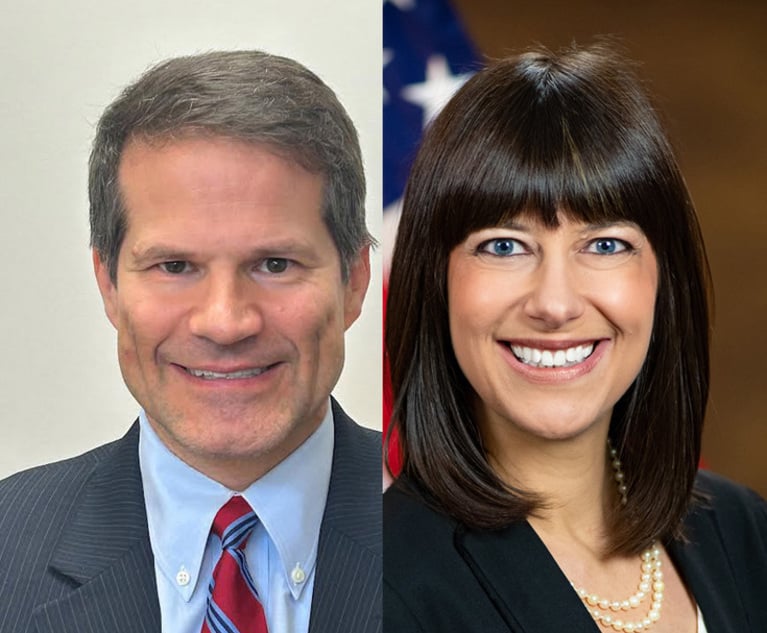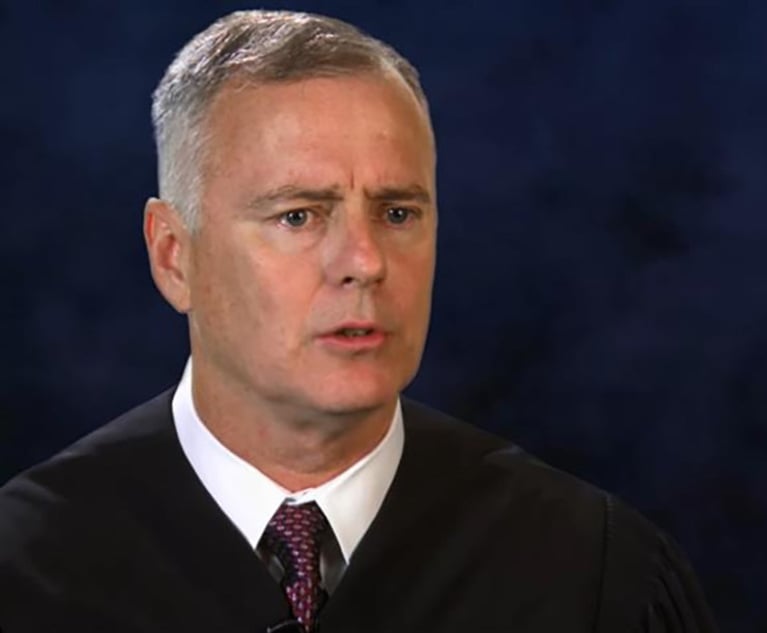 A protest outside CFPB headquarters in Washington on Nov. 27. Credit: C. Ryan Barber / NLJ
A protest outside CFPB headquarters in Washington on Nov. 27. Credit: C. Ryan Barber / NLJJustice Department, in Court, Argues Mick Mulvaney Is 'Proper' Interim CFPB Leader
Main Justice says in a court filing: "The confusion that presently exists surrounding the CFPB's acting directorship stems from plaintiff's meritless claims. The president, OLC, and the CFPB's general counsel all agree that Mulvaney is the acting director of the CFPB, and Acting Director Mulvaney has begun work at the agency."
November 27, 2017 at 06:26 PM
6 minute read
The U.S. Justice Department on Monday, defending the Trump administration's appointment of Mick Mulvaney as the interim director of the Consumer Financial Protection Bureau, urged a Washington federal judge not to block the president's plan for the transition of power at the Obama-era agency.
Mulvaney, director of the Office of Management and Budget, took the helm Monday as acting director, just as Leandra English, the agency's deputy director, claimed her hold as the temporary leader. The dispute erupted over the Thanksgiving holiday, when the departing director, Richard Cordray, promoted English to the deputy slot—a move that put her in line temporarily to take over the agency until a permanent director is nominated and confirmed by the U.S. Senate.
 Leandra English. Credit: Credit Union National Association.
Leandra English. Credit: Credit Union National Association.English, formerly the CFPB's chief of staff under Cordray, on Sunday night sued Mulvaney and Trump. Her complaint—filed by former CFPB attorney Deepak Gupta of Washington's Gupta Wessler—urged a judge to issue a temporary restraining order stopping Mulvaney's control of the agency.
U.S. District Judge Timothy Kelly on Monday afternoon met with the lawyers in the case but did not rule from the bench. Kelly, a Trump appointee to the federal trial court, did not indicate when he would rule. Brett Shumate, a former Wiley Rein partner, argued for the government. Top Main Justice lawyers—including Chad Readler, the acting head of the civil division—attended the argument.
Shumate pointed to an opinion from the Justice Department's Office of Legal Counsel and a memo by CFPB general counsel Mary McLeod, both of which supported the president's authority to appoint an acting CFPB director under the Federal Vacancies Reform Act. The law, which allows the president to fill certain vacancies with officials already confirmed to other positions, does not apply to some independent agencies. But the CFPB, Shumate said, is not one of those exempted independent agencies.
“Mr. Mulvaney was a proper person who could be designated,” Shumate said.
The lawsuit alleged the Trump administration's move to install Mulvaney violated the terms of the Dodd-Frank financial reform law. That law, which itself gave rise to the consumer bureau, says the deputy director would take over leadership in the absence of a director. The White House announced Mulvaney's appointment last week, hours after Cordray said English would become the deputy director, a slot that had been unfilled for some time.
On Monday, Gupta said the legislative history of Dodd-Frank dictated a “mandatory” succession process under which the deputy director would serve as acting director until a new permanent director was confirmed by the Senate. He also argued Mulvaney's appointment to the acting director role undercuts the CFPB's independence.
“It would be as if an economic adviser of the president served as chair of the Federal Reserve Board,” Gupta said in court Monday.
Gupta is seeking an emergency temporary restraining order blocking the appointmentof Mulvaney. Shumate disputed the need for any emergency decision, telling Kelly that it “really wouldn't be necessary.”
Shumate said Mulvaney was welcomed at the CFPB headquarters Monday morning and “treated as acting director of the CFPB.” While he could not assure Kelly that English would keep the deputy role under Mulvaney, Shumate said he had “no knowledge” of plans to remove her from the agency.
The White House earlier pointed to the Office of Legal Counsel opinion and McLeod's memo in making the case in support of Mulvaney.
“Now that the CFPB's own general counsel—who was hired under Richard Cordray—has notified the bureau's leadership that she agrees with the administration's and DOJ's reading of the law, there should be no question that Director Mulvaney is the acting director,” Sarah Sanders, the White House press secretary, said in a statement. “It is unfortunate that Mr. Cordray decided to put his political ambition above the interests of consumers with this stunt. Director Mulvaney will bring a more serious and professional approach to running the CFPB.”
McLeod, the general counsel, was on the Justice Department's brief filed late Monday in response to the suit English filed.
WATCH: NLJ affiliate Credit Union Times spoke with Mulvaney in 2014 about the CFPB, which the then-U.S. representative called a “sick, sad joke.”
READ: The Justice Department's brief filed Monday is posted here:
Read more:
This content has been archived. It is available through our partners, LexisNexis® and Bloomberg Law.
To view this content, please continue to their sites.
Not a Lexis Subscriber?
Subscribe Now
Not a Bloomberg Law Subscriber?
Subscribe Now
NOT FOR REPRINT
© 2024 ALM Global, LLC, All Rights Reserved. Request academic re-use from www.copyright.com. All other uses, submit a request to [email protected]. For more information visit Asset & Logo Licensing.
You Might Like
View All

Trump's Solicitor General Expected to 'Flip' Prelogar's Positions at Supreme Court

Auditor Finds 'Significant Deficiency' in FTC Accounting to Tune of $7M
4 minute read
Texas Court Invalidates SEC’s Dealer Rule, Siding with Crypto Advocates
3 minute readTrending Stories
- 1LexisNexis Responds to Canadian Professor’s Criticism of Lexis+ AI
- 2'Everything Leaves a Digital Footprint': How to Navigate the Complexities of Internal Investigations
- 3Baker McKenzie Accepts Defeat on Australian Integration With Firm's Asia Practice
- 4PepsiCo's Legal Team Champions Diversity, Wellness, and Mentorship to Shape a Thriving Corporate Culture
- 5The Dynamic Duo Behind CMG's Legal Ops Team
Who Got The Work
Michael G. Bongiorno, Andrew Scott Dulberg and Elizabeth E. Driscoll from Wilmer Cutler Pickering Hale and Dorr have stepped in to represent Symbotic Inc., an A.I.-enabled technology platform that focuses on increasing supply chain efficiency, and other defendants in a pending shareholder derivative lawsuit. The case, filed Oct. 2 in Massachusetts District Court by the Brown Law Firm on behalf of Stephen Austen, accuses certain officers and directors of misleading investors in regard to Symbotic's potential for margin growth by failing to disclose that the company was not equipped to timely deploy its systems or manage expenses through project delays. The case, assigned to U.S. District Judge Nathaniel M. Gorton, is 1:24-cv-12522, Austen v. Cohen et al.
Who Got The Work
Edmund Polubinski and Marie Killmond of Davis Polk & Wardwell have entered appearances for data platform software development company MongoDB and other defendants in a pending shareholder derivative lawsuit. The action, filed Oct. 7 in New York Southern District Court by the Brown Law Firm, accuses the company's directors and/or officers of falsely expressing confidence in the company’s restructuring of its sales incentive plan and downplaying the severity of decreases in its upfront commitments. The case is 1:24-cv-07594, Roy v. Ittycheria et al.
Who Got The Work
Amy O. Bruchs and Kurt F. Ellison of Michael Best & Friedrich have entered appearances for Epic Systems Corp. in a pending employment discrimination lawsuit. The suit was filed Sept. 7 in Wisconsin Western District Court by Levine Eisberner LLC and Siri & Glimstad on behalf of a project manager who claims that he was wrongfully terminated after applying for a religious exemption to the defendant's COVID-19 vaccine mandate. The case, assigned to U.S. Magistrate Judge Anita Marie Boor, is 3:24-cv-00630, Secker, Nathan v. Epic Systems Corporation.
Who Got The Work
David X. Sullivan, Thomas J. Finn and Gregory A. Hall from McCarter & English have entered appearances for Sunrun Installation Services in a pending civil rights lawsuit. The complaint was filed Sept. 4 in Connecticut District Court by attorney Robert M. Berke on behalf of former employee George Edward Steins, who was arrested and charged with employing an unregistered home improvement salesperson. The complaint alleges that had Sunrun informed the Connecticut Department of Consumer Protection that the plaintiff's employment had ended in 2017 and that he no longer held Sunrun's home improvement contractor license, he would not have been hit with charges, which were dismissed in May 2024. The case, assigned to U.S. District Judge Jeffrey A. Meyer, is 3:24-cv-01423, Steins v. Sunrun, Inc. et al.
Who Got The Work
Greenberg Traurig shareholder Joshua L. Raskin has entered an appearance for boohoo.com UK Ltd. in a pending patent infringement lawsuit. The suit, filed Sept. 3 in Texas Eastern District Court by Rozier Hardt McDonough on behalf of Alto Dynamics, asserts five patents related to an online shopping platform. The case, assigned to U.S. District Judge Rodney Gilstrap, is 2:24-cv-00719, Alto Dynamics, LLC v. boohoo.com UK Limited.
Featured Firms
Law Offices of Gary Martin Hays & Associates, P.C.
(470) 294-1674
Law Offices of Mark E. Salomone
(857) 444-6468
Smith & Hassler
(713) 739-1250








